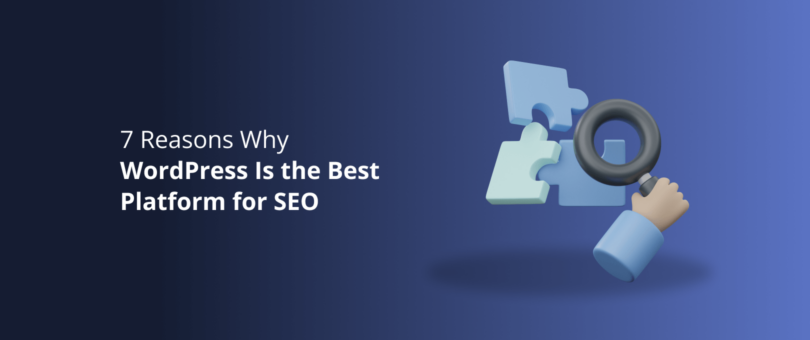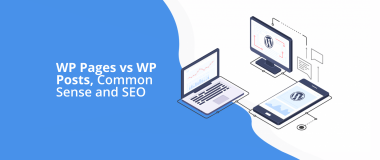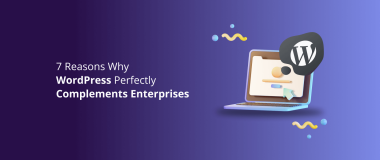Are you aware that the most successful SEO experts use and recommend WordPress? Not surprisingly, one of the reasons why WordPress is so ahead of the competition is that it works so well for search engine optimization.
Don’t take our word for it. Look up your favorite publishers, blogs, and media sites you frequently use. The majority of them are powered by the leading market player.
Readers Also Enjoy: How to Create the Perfect WordPress Structure for SEO
WordPress for SEO Dominance
SEO is a big part of any business’ digital strategy. When it comes to deciding on your website builder and which platform is the best option for you, you need to think about traffic. To have visitors rushing to your site, you need to think about searchability and visibility, and which content management system (CMS) would best support this. We reckon that the answer is WordPress.
WordPress is the most popular CMS. Nowadays, users from all over the world build WordPress sites, from small business owners, who want to expand their businesses online to authorities in different niches. More specifically, 43.2% of the websites on the internet are powered by WordPress.
Readers Also Enjoy: 26 Major Brands with WordPress Websites
But what makes WordPress so unique? Well, here are some answers:
Why WordPress for SEO is the Best Choice
- Pretty Permalinks
- Adding Metadata Automatically
- SEO-Optimized Images
- User Experience
- Site Speed
- Mobile Optimization
- Omnichannel Integrations
1. Pretty Permalinks
Permalinks are the URLs on your site. You can easily edit your permalinks when you work on your WordPress dashboard. It can be done by visiting the settings and giving it the format you want. By default, it should look something like https://yoursite.com/?p=123.
When you customize it, a format like http://yoursite.com/%postname%/ is better for the search engines and for your visitors, who should be able to figure out the topic of your article from the link.
The permalinks can affect your ranking in two ways:
- Keywords in the link are an essential ranking factor.
- Pretty permalinks can increase the CTR of your posts across search engines.
CTR is the click-through rate for a link, which is also a Google ranking factor. When you get fewer clicks than expected, Google will drop you into lower positions while improving the position of sites with a high CTR.
Lastly, a non-SEO reason can also harm your traffic. If your link is viewable, you will get fewer visitors from other sources as well as social media; especially, when you use ugly permalinks. So, customizing the permalinks is a much better approach than leaving them with the default option.
2. Adding Metadata Automatically
The SEO title and the meta description are two major ranking factors. You need to add them to almost every post and page of your website, including the targeted keyword in the metadata, which can improve your position significantly.
Also, they help to increase your CTR since they are viewable on search engines. You only need to install one of the many free SEO plugins available for WordPress. Meta descriptions can be generated automatically – and you can mold the target keywords manually for each article to optimize for the best-targeted ones you want to rank higher for.
This process does not take more than a few minutes. Then, you can use the same plugin for every post. When you do not add the metadata manually, a plugin like Yoast SEO or All in One SEO will get the needed information from the title and the first sentences of your content.
As an award-winning WordPress agency, we’ve built and scaled:
- Several leading international media outlets in the US, England, South Africa, Australia, Bulgaria, Nigeria (top 3 digital magazines or news websites)
- Some of the largest eCommerce brands in their corresponding categories
- Fortune 1000s
- Financial institutions (including 3 banks)
SEO is an inseparable requirement for each of them because great organizations depend on branding – and organic search is a reputable way to put your money where your mouth is (in educating your audience and providing helpful content.)
Moreover, Facebook and Twitter (X) pulled back from media exposure years ago after the Cambridge Analytica scandal around the US elections. Facebook pages and Twitter accounts diminished in popularity and reach, making SEO ever so important.
3. SEO-Optimized Images
Images are a valuable SEO asset and play an important role in ensuring your content is interesting, accessible, and engaging.
On the one hand, they supply search engine bots with important contextual information. According to Moz, one-third of all Google searches happen on Google Images.
On the other hand, optimized images can speed your page loading time, improve user experience and provide additional ranking opportunities.
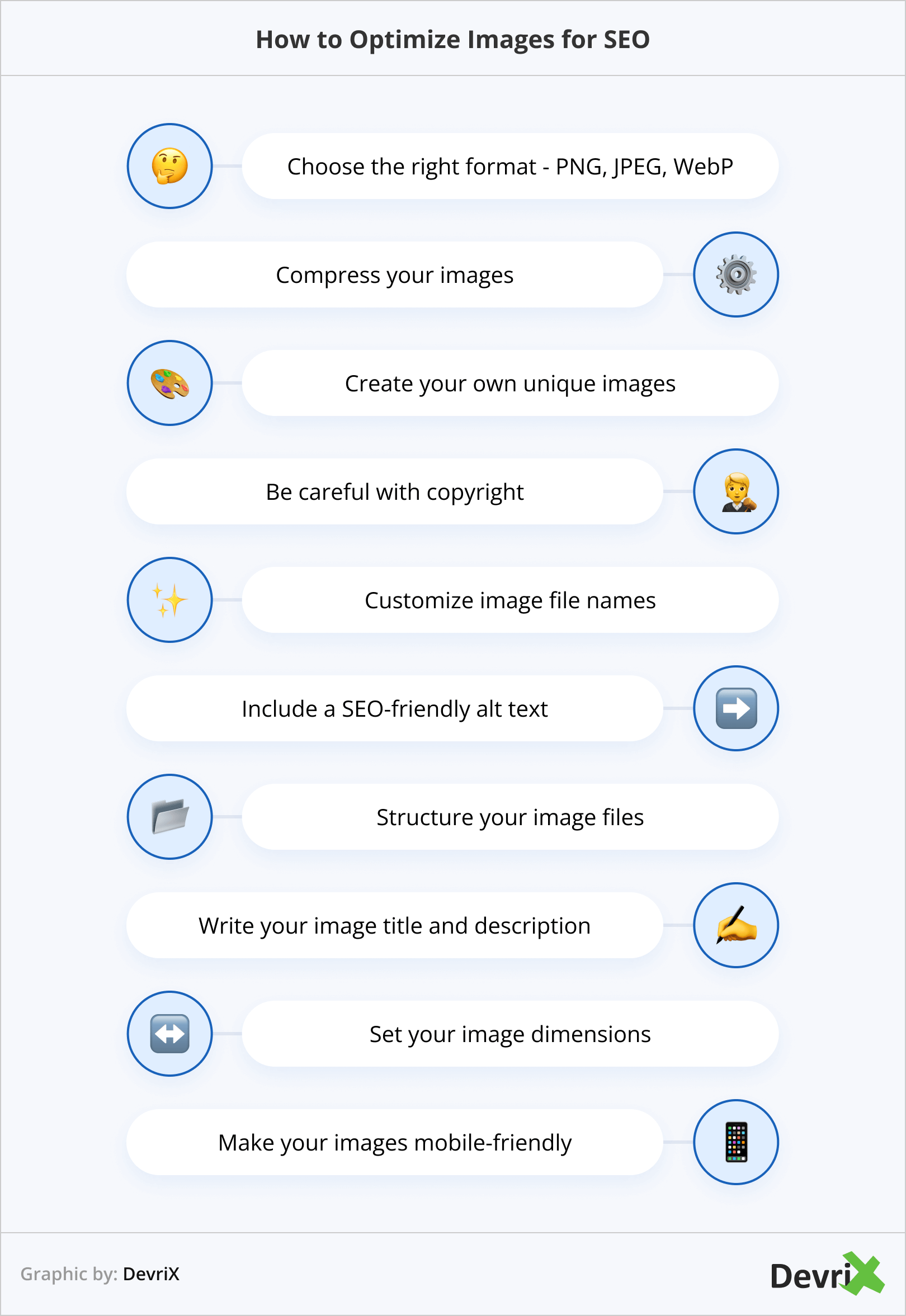
If you want to get maximum exposure, you need to optimize your images for SEO. You can do this by going to the edit options of an image and filling in the “Alternative Text” box.
The alt text is important for accessibility reasons as well – this is what braille readers comprehend and any enterprise organization complying with WCAG standards must keep these tidy and properly populated.
To get the best results, include a version of your keyword. By customizing your articles, you are two clicks away from optimizing any image on your page for SEO.
Lastly, you can edit the size of an image to improve the page speed. You can even use a plugin for this step. There are many free options available that can optimize the size of many images automatically.
4. User Experience
A bad user experience can be anything from a bad web design to poorly structured content and images that are not relevant to the copy.
Google can understand how good any website’s user experience is from metrics like the bounce rate, the average time spent on a page, shopping cart abandonment, etc.. It’s important that you keep track of such metrics and you can do that by looking at your Google Analytics account.
Some indicators for a bad user experience are:
- Low-conversion rate
- High overall bounce rate and higher bounce rate on mobile
- Users aren’t engaging with your content – not sharing, commenting, citing it
- Low completion rate in filling a form, finishing a purchase, etc.
However, following the best user experience practices, you can keep your visitors on your site for longer and receive additional engagement with your content. So, which Google Analytics metrics indicate a good user experience, then?
- More pageviews
- Increase in the number of subscribers
- High conversion and completion rates
- Low bounce rate
- Increase in session duration time
WordPress provides many options to customize your site with many great plugins and themes available, more than any other competitor.
And considering the growing market share, virtually every conversion rate optimization or UX SaaS coming on the market can’t wait to integrate with WordPress and tap into the endless pool of websites online.
5. Site Speed
Google is pretty keen on speed, and as such, it has included site and page speed as a ranking signal. In fact, Google takes page speed into consideration specifically, because the faster a page can load the easier it is for the search engine to crawl the whole website and index it appropriately.
Additionally, page/site speed is really important for user experience. Pages with shorter loading times have a lower bounce rate and higher average time spent on page.
For those who already use WordPress, site speed should not be a problem. There are many fast-loading themes to meet every need. You also can find plugins that were actually created to improve site speed.
To ensure everything works and loads smoothly, you can check your site speed on Google’s PageSpeed Insights. The PageSpeed score includes data from reports on two essential speed metrics DOMContentLoaded (DCL) and First Contentful Paint (FCP), as well as data from Chrome User Experience Report (CrUX). These help evaluate page performance on both desktop and mobile devices, and provide suggestions about how to improve it.
Some common reasons for a slow-loading WordPress site can include non-optimized images and digital assets, poor web hosting services, using too many plugins, and more. And because speed is really important, it’s essential to be aware of what potential roadblocks can appear, when and under what circumstances, so you can learn how to approach and deal with them.
Speed Bonus: NitroPack
One of the leading solutions to resolve SEO issues through improving your Core Web Vitals ranking is utilizing NitroPack – a leading turnkey performance optimization solution that works out of the box.
NitroPack is now recommended by Google as a reliable solution for small and medium-sized businesses – and works exclusively with WordPress.
The core team provides training sessions and webinars along with Google experts on improving the state of the web.
Our founder is a technical advisor for NitroPack and one of the first ambassadors of the platform since its early inception. Since we’re committed to providing excellent user experience and hit performance metrics for our leading brands, this is one of the performance tools used in our stack.
6. Mobile Optimization
The number of the users, who use search engines from their smartphones and tablets, has increased over the last few years. Over 55% of all online searches happen on mobile. So, if entrepreneurs want to keep their digital competitive advantage, they must adapt to this new trend.
If you use WordPress, you have nothing to worry about. Most themes are already optimized for mobile phones. Additionally, when you customize your website, you can check how it looks on all the different devices. While we take for granted that any theme should be responsive, you still can see website owners who are trying to figure out how to do it.
Google wants to find a mobile version of your site and introduced mobile-first indexing when evaluating and ranking a site. So, if you want to be on Google’s good side, you need to ensure that the mobile version of your site is of the same quality as your regular desktop version.
This means that your site should load quickly, have intuitive navigation and ensure that users can perform various tasks without a problem.
7. Omnichannel Integrations
Many online marketers overlook the importance of social media when they talk about SEO. While social media may not influence website ranking and SEO, the links you share across different platforms help increase brand visibility.
If you engage an audience on social media, your rankings will be better. The opposite applies as well when you have a high ranking, more engagement is expected on your social media posts also. The more social shares your site has the more likely it is to reach your target audience.
It is not about how many followers you have but how active other people are in your posts (likes, comments, shares). The likes, comments, and shares your posts receive are signals that search engines use when indexing and ranking your site. It matters how your brand engages online and how users talk about it, because those conversations influence search queries.
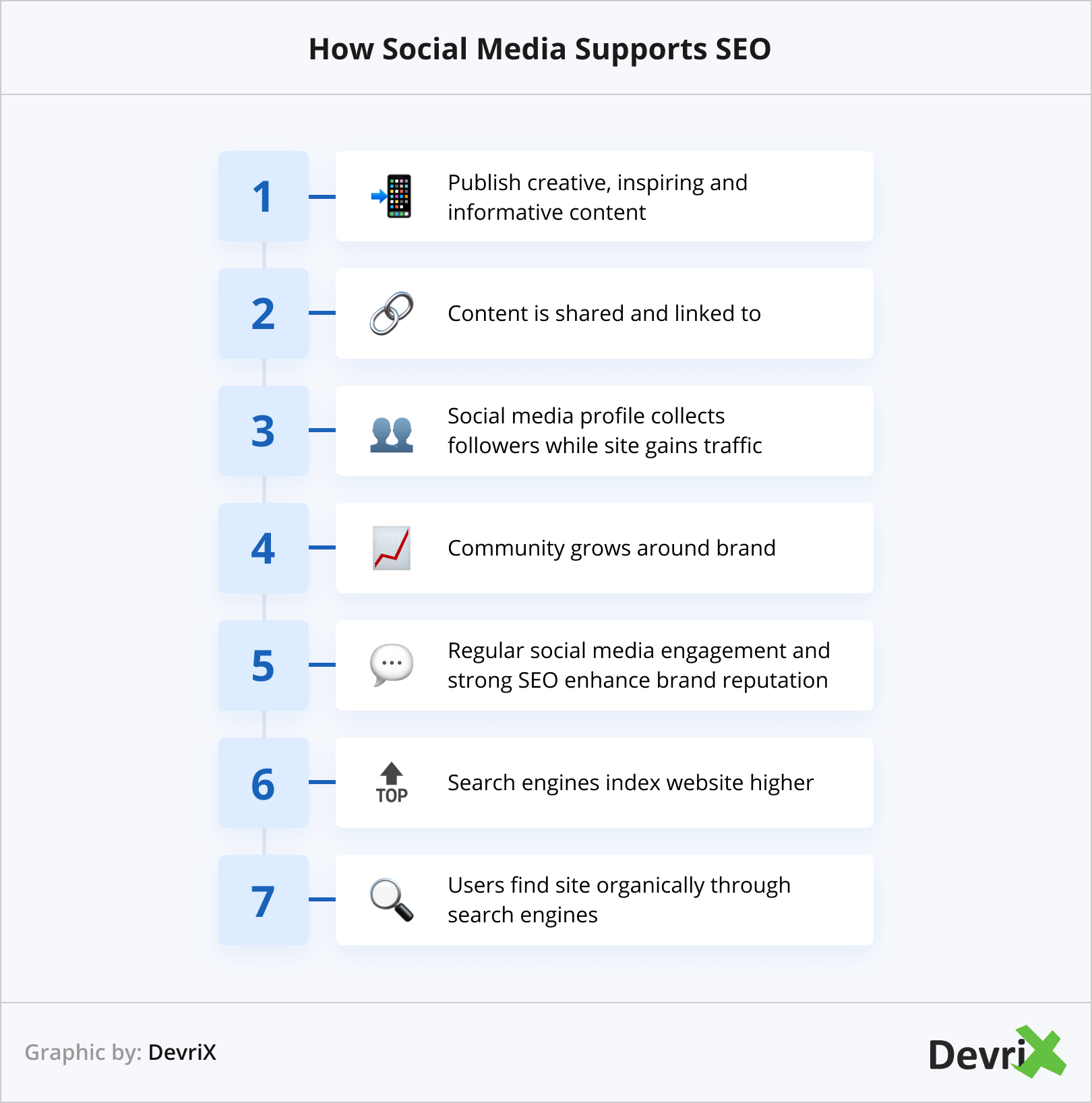
When it comes to social media and SEO, WordPress is once again ahead of its competition. There are hundreds of plugins available, created to maximize your social media exposure. You can use them to automate your campaigns, add social media buttons to your content to get shares from your visitors, embed a social media feed on your website, and many other options to encourage your guests to be a part of your social media campaigns.
Aside from social media, we shouldn’t neglect email marketing, influencer marketing, affiliate marketing – and other forms of cross-promotions required to build a successful business.
Utilizing other channels not only increases direct traffic to your website, but also amplifies the number of brand queries that Google accounts for when ranking your website. The more searches for your branded term, the higher authority Google assumes (and helps you rank even higher).
Final Thoughts
Using WordPress benefits the user and your brand and business growth. With its unique features and tools, this platform is perfect for businesses of any size. It’s easy to use, scalable and constantly evolving, offering the flexibility your website needs.
This is why WordPress is best for SEO, and the preferred CMS choice for us at DevriX. With it we’ve helped plenty of businesses scale and grow, while contributing to making the platform as great as possible.
If you want to explore the best mix of ongoing stability, feature development, and organic positioning through our expert team, check out our WordPress retainer plans.
